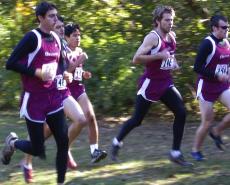At four in the afternoon, in the sweltering heat, the last thing most students want to do is run eight miles. Yet cross country runners willingly put themselves through this seemingly torturous routine every day.”Cross country definitely brings in a certain type of person,” said Coach Jamie LaFollette, a junior. “It takes a certain mentality to go out in 80 or 90 degrees and run. Most runners have very strong internal drives to be able to push themselves and do it independently.”
Though many cross country runners claim to be unsure as to why they run cross country, most agree that there is an addicting factor to it.
“Everyone loves it but they have no idea why,” said first-year Grace Normann. “I guess it’s just one of the more satisfying sports when it goes well. When you work really hard and it pays off, it really feels good even if you might not be able to walk up the stairs for a few weeks.”
Guilford’s cross country program, started in 2004, is fairly new. The captains this season are Chris Walker and Brett McDonough on the men’s side, and Emily Frenzel on the women’s side. With 24 runners, including 14 returning letter winners, the team has a chance to be competitive in the Old Dominion Athletic Conference (ODAC).
“We’re really excited about this year,” said Walker. “We’ve been putting out lots of effort and lots of time.”
The ODAC pre-season coaches’ poll placed the Guilford men’s cross country team sixth, and the women’s team seventh in the conference.
The men’s team placed third out of five teams, while the women placed fifth out of seven teams in last weekends’ Marlin Invitational meet in Virginia Beach. Top runners were first-years Grace Normann, who placed 14th, and Jeremy Wang ,who placed 17th. Sophomore Charissa Duncan placed 15th.
LaFollette expects the women’s team to be quite strong this year, having lost only one runner out of last year’s top five.
“We lost our top three runners from last year on the men’s side, none of which were seniors,” said LaFollette. “We were going to be really good, but now we’ll have to wait and see. We’re young so we’re going to improve.”
The Guilford team has the advantage of being able to practice on the loops that run through 250 acres of woods on campus. They also have a cross country course on campus that is suitable for 5k, 6k and 8k races.
Practices are usually structured with a one mile warm up, followed by stretching before the workout begins. The team lifts weights after practice twice a week. Every Wednesday, the team works out by running in place in the diving well.
“One of the most common injuries with runners is tendonitis and stress fractures, which come from the repetition of your foot hitting the pavement over and over again,” LaFollette explained.
Pool practices are designed to help prevent injury while still getting a heart-rate-elevating workout.
“Jamie’s really good about knowing what everyone can handle,” said Normann. “If the whole team is exhausted and bombing it, he’ll cut back.”
To think that coaching cross country is pretty straightforward and easy – “Run faster!” – is far from the truth.
“Jamie’s job is actually really hard,” said first-year Leon Odell. “He plans all the workouts and calculates the times for all the runners.”
As a coach, LaFollette must know each runner’s personal strengths and weaknesses in order to give useful advice.
“Coaching advice is two fold,” LaFollette explained. “My [first] job is to essentially get them as physically fit as possible. We talk about VO2 max, the way we use oxygen. We do runs that better gun at our VO2 thresholds.”
VO2 max is the highest amount of oxygen one can use in one minute, per kilogram of body weight. As you become more fit, your VO2 max increases allowing you to do more intense workouts easier and at a faster pace.
The strategy involved in racing is perhaps just as important.
“Jamie might be telling one person [to] be more conservative on the first mile and then speed up, and then to someone else he might say to go really hard on the first mile and then don’t worry about the rest,” said Normann.
Cross country is one sport where you really can’t pull off being lazy. It is very much an individual sport and every minute will make or break how well you do.
LaFollette’s job is to make sure his team remains focused and driven, even on difficult days.
“He sees the bigger picture whereas we’re just trying to make it through one race,” said Walker. “He keeps us motivated for a long term goal.”
In a sport with no communication or teamwork during competitions, you would think that there is less interaction among teammates, but this is not the case.
“There’s kind of a connection between painful sports and getting along really well with your team,” said Normann.
Practices can be physically and mentally draining, but the team generally keeps a positive attitude. Odell put it in perspective: “Running itself is not fun, so everyone has to be nice and make it fun for everyone’s sake.

